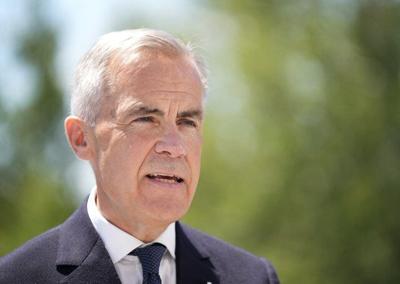WASHINGTON - Prime Minister Mark Carney said Monday that Canada's negotiations with the United States are in an "intense phase" after President Donald Trump achieved a critical agreement with the European Union days away from his tariff deadline.
The prime minister's comments come after Trump last week told reporters that Canada wasn't a priority ahead of his Aug. 1 deadline to make trade deals.
"There are many aspects to these negotiations," Carney said in P.E.I. "We are engaged in them but the assurance for Canadian business, for Canadians, is we will only sign a deal that's the right deal, that's a good deal for Canada."
The EU framework announced Sunday gave Trump a much-needed win as he looks to realign global trade — and it indicates that no nations are likely to get a reprieve from his tariffs.
It sets a 15 per cent tariff on most goods, including European automobiles. Trump said 50 per cent tariffs will remain on steel and aluminum.
Other details of the deal remain unclear, including its effects on measures the U.S. considers trade irritants, such as Europe's digital services taxes and non-tariff barriers.
Trump said the EU had agreed to buy US$750 billion worth of U.S. energy and invest an additional US$600 billion in the United States. The president recently said that countries will have to "buy down" the threatened tariff rate.
Baseline tariffs were also a part of trade deal frameworks previously announced for Japan, Vietnam, Indonesia, the Philippines and the United Kingdom.
Countries around the world have been watching to see how many trade deals materialize before the deadline, and what can be gleaned from them for their own negotiations with the Trump administration.
Christopher Sands, director of Johns Hopkins University's Center for Canadian Studies, said the EU deal builds on Trump's negotiating style — he loses interest, suggests no deal will happen, insults the other side and "then at the 11th hour something comes through."
"I know there's been a lot of negativity around a Canada security and economic agreement but it doesn't necessarily mean that we are doomed," Sands said. "It may be that we are close and we have a surprise deal."
Trump sent a letter to Carney threatening to impose 35 per cent tariffs if Canada doesn't make a trade deal by Friday. The White House has said those duties would not apply to goods compliant with the Canada-U.S.-Mexico Agreement on trade, better known as CUSMA.
Carney and other Canadian officials have been downplaying expectations that a deal will be made by Friday.
Most of the goods Canada sends to the U.S. are CUSMA-compliant and won't be affected by the 35 per cent duties. The Canadian economy is still being slammed by Trump's Section 232 tariffs on steel, aluminum and automobiles, and will be hit by copper tariffs the president has said will take effect by the week's end.
So far, Trump's trade deals "are really bad omens for Canada," said William Pellerin, a trade lawyer and partner at the firm McMillan LLP.
"(It shows) that the tariffs, particularly the sectoral tariffs, are stickier than we would have thought," Pellerin said. "If none of those countries were able to secure a drop in the sectoral tariffs, that is certainly bad news."
Those Section 232 duties are a key target for Canadian negotiators and Pellerin said it's unlikely any deal will be struck by Ottawa if they remain at their current levels.
While there are similarities between the Canada-U.S. negotiations and those involving Europe, Carney said there are also many differences. While Europe is looking to end its reliance on Russian energy, Carney said Canada is a reliable supplier of energy to the United States.
The prime minister said negotiations remain complex but "there is a landing zone that's possible."
"But we have to get there," he said.
The EU agreement also averts significant retaliatory duties from a major United States customer — meaning that if Canada can't reach a deal with Washington, it would be more isolated if it attempts to retaliate against the U.S.
Canada and China have implemented retaliatory tariffs in response to Trump's trade war but, to allow talks to continue, Ottawa didn't move forward with additional duties.
Ontario Premier Doug Ford said Monday he supports a dollar-for-dollar tariff response, particularly to Trump's treatment of Canada's steel and aluminum industry.
"I'm confident with Prime Minister Carney, I know he’s going to do his very best to get a deal," Ford said. "But I don't trust President Trump."
B.C. Premier David Eby said Canada is in a "different position" than the European Union or Japan, given the deeply integrated nature of North American supply chains.
"We are a reliable partner, we are a good partner, but we also won't get kicked around," he said.
Sands said Carney's recent move to limit imports of foreign steel into Canada will help shore up the domestic market during the tariff tumult while also avoiding the ire of the Trump administration.
The prime minister recognizes you can engage in retaliation, Sands said, but "it doesn't bring you much joy." He said there are other actions, such as import quotas, that would better protect Canadian markets.
— With files from Liam Casey in Toronto and Wolfgang Depner in Victoria
This report by The Canadian Press was first published July 28, 2025.

